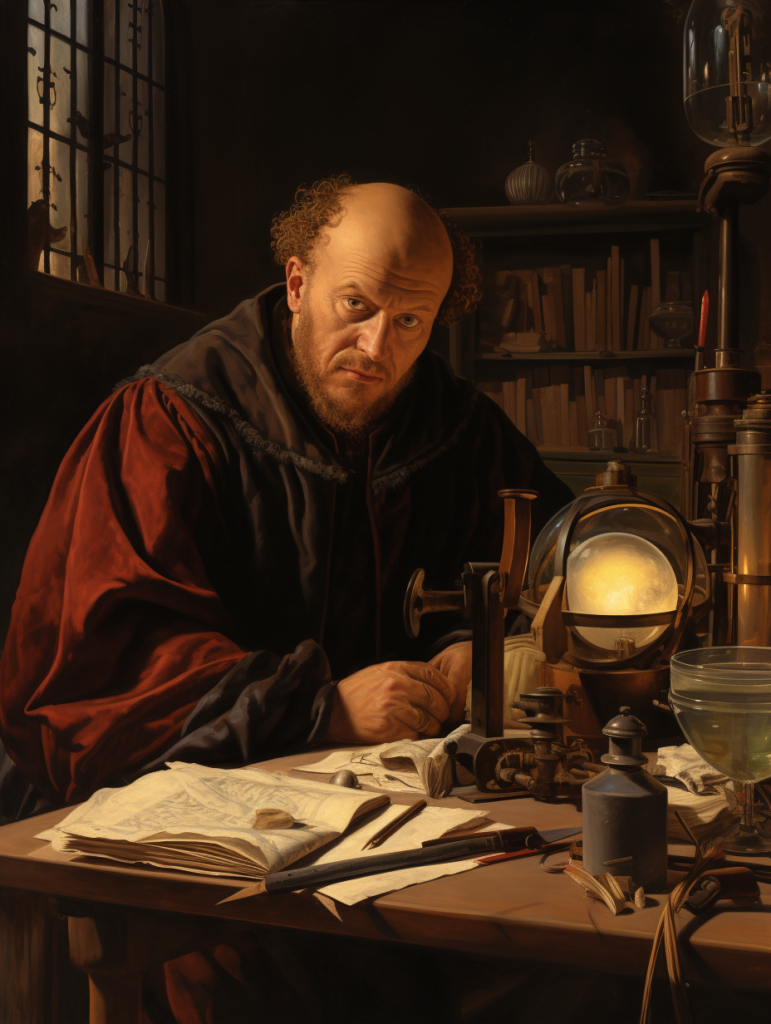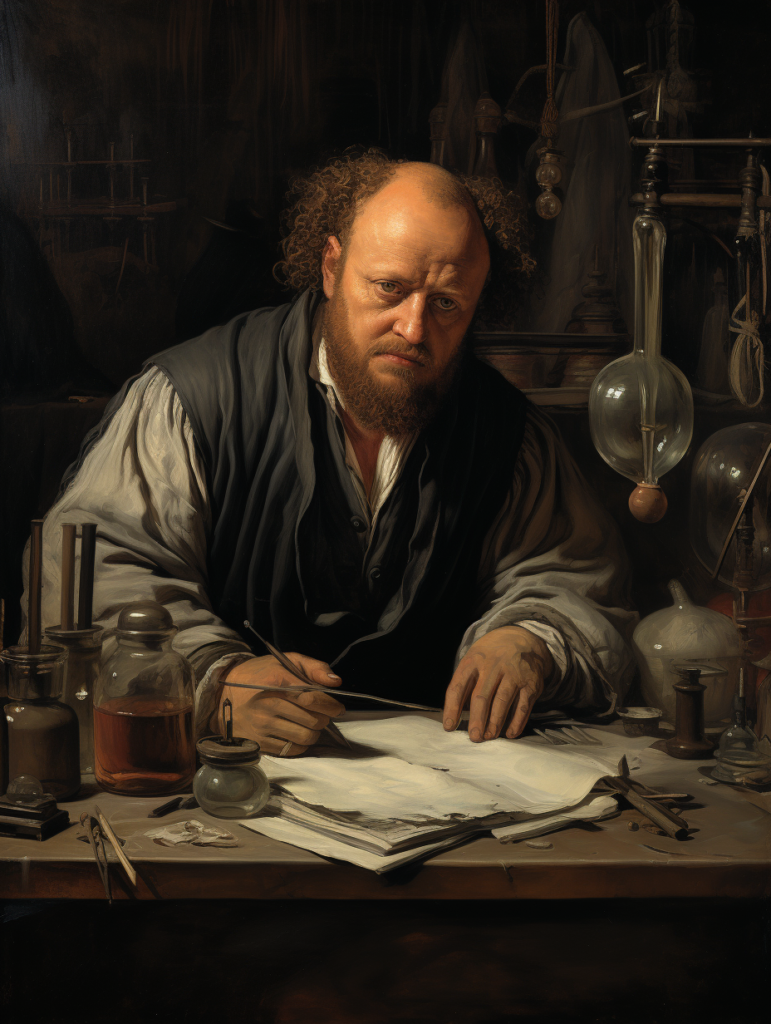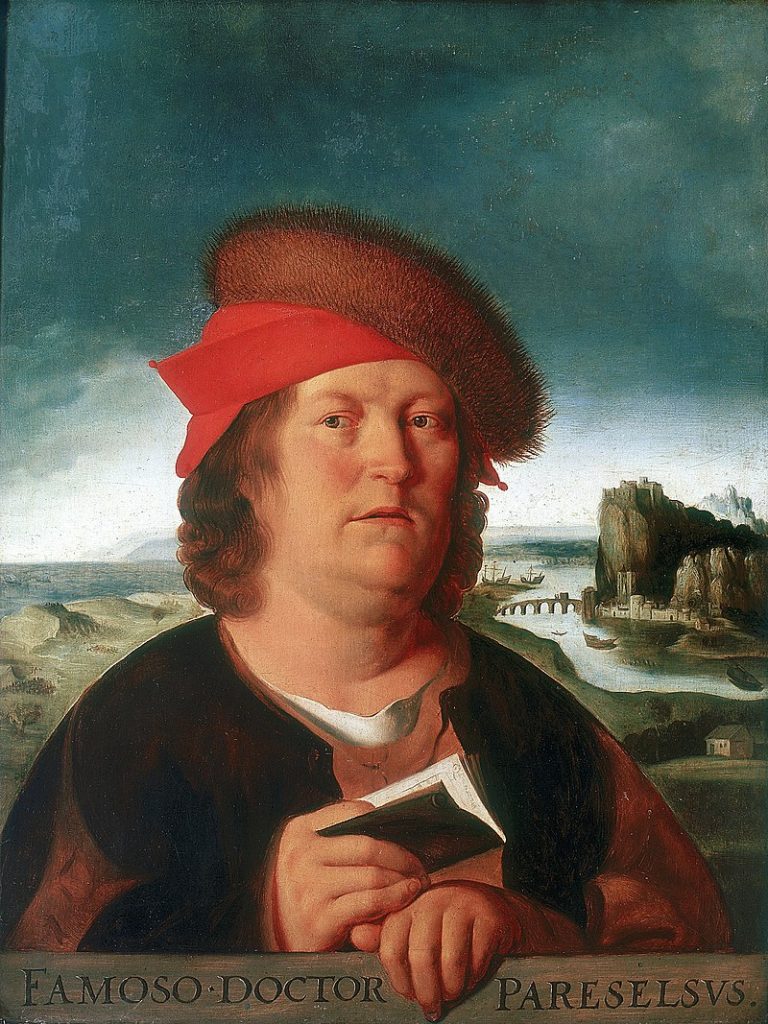Paracelsus, “The Alchemical Visionary”
He sought immortality through forbidden alchemy, but died from a tavern brawl – this is the enigmatic life of the rebel genius Paracelsus!

- Alias – Bombastus, Theophrastus Paracelsus
- Gender – Male
- Race – Human
- Occupation – Physician, Alchemist
- Religion – Christian
- Allies – Disciples, patients, alchemists
- Enemies – Traditional physicians, authorities
- Abode/Base of operations – Across Europe
- Nationality – Swiss
- Languages – German, Latin
- Alignment – Chaotic Good
- Affiliation(s) – None, individualist
- Significant others – None known
Paracelsus is a controversial physician who is revolutionizing medicine with his bold theories and practices. Though born to a modest Swiss family, he bucks the staid medical establishment by integrating principles of alchemy and astrology into treating patients. He rejects the ancient teachings of Galen and Avicenna, publicly burning their canonical books. Instead, Paracelsus learns from miners, midwives, priests—anyone with practical experience curing the sick. He gains his insights not just from scholarly books, but directly from nature, believing the Creator implanted healing secrets into creation.
This renegade attitude spurs the restless Paracelsus to wander across Europe like an occult vagabond—much to the establishment’s chagrin. When he does settle in a city as a physician, his bizarre herbal concoctions and opposition of traditional techniques invariably trigger controversy. Indeed, many find his ideas dangerously radical, labeling him a sorcerer rather than doctor. Though curing grateful patients energizes him, Paracelsus is prone to overtiring his welcome—usually after one of his animated diatribes while drunk. After yet another narrow escape from outraged local physicians, he resumes his wandering, writing feverishly to spread his ideas in a chaotic flood of books and pamphlets across the continent.
Beneath Paracelsus’ bravado lies a man exhausted by the opponents that constantly vilify him. While desiring fame and recognition for his advances, Paracelsus sacrifices much for his contrarian path, unable to find a community that accepts his intellectual rebelliousness. The slandered physician finds solace in the beauty of nature—discovering in her laws the patterns missing in society. Though he hopes one day his works will vindicate him, Paracelsus remains the perpetual outsider shouting for renewal, whatever the cost to himself.
Paracelsus, the Alchemical Sage

Medium humanoid (human), neutral
Armor Class 12 (15 with Mage Armor)
Hit Points 82 (15d8 + 15)
Speed 30 ft.
| STR | DEX | CON | INT | WIS | CHA |
|---|---|---|---|---|---|
| 10 (+0) | 14 (+2) | 12 (+1) | 18 (+4) | 16 (+3) | 10 (+0) |
Saving Throws Int +8, Wis +7
Skills Arcana +8, Medicine +7, Nature +8
Senses Passive Perception 13
Languages Common, Latin
Challenge 8 (3,900 XP)
Traits
Innate Spellcasting. Paracelsus’s innate spellcasting ability is Intelligence (spell save DC 16, +8 to hit with spell attacks). He can innately cast the following spells, requiring no material components:
At will: Mage Hand, Prestidigitation, Mending
3/day each: Detect Magic, Identify, Purify Food and Drink
Actions
Quarterstaff. Melee Weapon Attack: +3 to hit, reach 5 ft., one target. Hit: 3 (1d6) bludgeoning damage.
Alchemical Elixirs (Recharge 5-6). He can create and throw alchemical elixirs. Choose one of the following effects:
- Elixir of Healing: All allies within a 10-foot radius regain 2d6+4 hit points.
- Elixir of Shielding: Paracelsus or an ally within 30 feet gains a +2 bonus to AC for 1 minute.
- Elixir of Insight: Paracelsus or an ally within 30 feet gains advantage on the next Intelligence-based ability check.
Legendary Actions
Paracelsus can take 2 legendary actions, choosing from the options below. Only one legendary action can be used at a time, and only at the end of another creature’s turn. Paracelsus regains spent legendary actions at the start of his turn.
Alchemy. He creates a beneficial elixir, choosing one of the effects from his Alchemical Elixirs.
Mystical Barrier (Costs 2 Actions). He surrounds himself with a mystical barrier, gaining temporary hit points equal to 1d8 + his Intelligence modifier.
Reactions
Arcane Deflection. He can use his reaction to add +4 to his AC against one attack.
Healing Touch. When Paracelsus or a creature within 5 feet of him takes damage, he can use his reaction to expend a spell slot and heal the creature for 1d8 plus his Intelligence modifier.
Equipment
- Quarterstaff
- Explorer’s Pack
- Scroll of Alchemical Formulas
- Bottle of Rare Reagents
- Scholar’s Robes
- Alchemy Kit
Magic Items
- Cloak of Protection: This cloak grants a +1 bonus to Paracelsus’s AC and saving throws.
- Alchemist’s Stone: Paracelsus can use this stone to regain 2d4+2 hit points as a bonus action.
- Book of Ancient Knowledge: Paracelsus gains advantage on Intelligence checks to recall information related to alchemy, medicine, and arcana.
Lair Actions
On initiative count 20 (losing initiative ties), Paracelsus takes a lair action to cause one of the following effects:
- He summons an ephemeral alchemical apparatus that produces a cloud of mist, providing half-cover to allies for 1 round.
- He activates an arcane ward, granting himself and his allies within 30 feet advantage on saving throws against spells for 1 round.
Legendary Lair Actions
Paracelsus can take 3 legendary lair actions, choosing from the options below. Only one legendary lair action option can be used at a time and only at the end of another creature’s turn. Paracelsus regains spent legendary lair actions at the start of his turn.
- Elixir Fountain. He causes a magical elixir fountain to appear, allowing all allies within 60 feet to regain 2d6+4 hit points.
- Transmutation Circle. He activates a transmutation circle, granting all allies within 30 feet advantage on their next attack roll.
- Alchemical Surge. Paracelsus triggers a surge of alchemical energy, causing all enemies within 30 feet to make a DC 16 Constitution saving throw or be poisoned for 1 minute. They can repeat the saving throw at the end of each of their turns, ending the effect on a success.
Currently in the World
Paracelsus stands leaning arrogantly against a wooden table cluttered with strange instruments within his candlelit laboratory, currently animated in another late-night study session. His confident face thinly masks fatigue from ceaseless work as he alternates between madly scribbling notes and peering at bubbling alembics. Though only in his thirties, his unkempt ginger hair and beard show early flecks of gray from his restless life on the road. Dressed in a simple black scholar’s robe, he is adorned only by an engraved dagger at his waist and a pendant bearing the royal Hungarian coat of arms—an token of appreciation from a prince he once healed.
Shelves filled with curious tomes and all manner of medicinal concoctions line the circular stone walls, interspersed by astrological charts. Though normally traveling constantly, Paracelsus has temporarily made this space at a small university his base of alchemical operations. He works obsessively—wanting to record his innovative experiments before yet another confrontation with the academic elite forces him to flee into the night. Preternaturally energetic despite the late hour, Paracelsus pauses only to gulp wine from a wooden goblet as his brilliance threatens to outpace even his manic pace.
Paracelsus’s Historical Story

pic/paracelse.htm, Public Domain, https://commons.wikimedia.org/w/index.php?curid=43352
An alchemist, physician, astrologer, and general occultist. Born Phillip von Hohenheim, he later took up the title Paracelsus.
Paracelsus, whose real name was Philippus Aureolus Theophrastus Bombastus von Hohenheim, was a Swiss physician, alchemist, and philosopher who lived during the Renaissance period. He was born in 1493 or 1494, and his exact birthdate is uncertain. He is known for his significant contributions to the fields of medicine, chemistry, and alchemy.
Early Life:
Paracelsus was born into a family of physicians and chemists in the Swiss village of Einsiedeln. He began his studies in alchemy, astrology, and natural philosophy at a young age under the guidance of his father. His early education laid the foundation for his later revolutionary ideas in the realms of medicine and alchemy.
Academic Wanderings:
Rejecting the traditional teachings of his time, Paracelsus embarked on extensive travels throughout Europe and the Middle East. He studied at various universities, engaging in both academic learning and practical experiences. During his journeys, he gathered knowledge from diverse sources, including the teachings of Islamic and Jewish scholars, as well as insights from folk healers.
Contributions to Medicine:
Paracelsus’s approach to medicine was characterized by a rejection of the classical authorities like Galen and Aristotle. He emphasized direct observation, experimentation, and a holistic understanding of the human body. He introduced new concepts such as the “microcosm” and “macrocosm,” drawing connections between the human body and the broader universe.
His innovations included the use of chemical substances in medicine, challenging the prevailing reliance on herbal remedies. Paracelsus also introduced the idea of the “archeus” or vital force within the body, influencing later concepts in vitalism.
Alchemical Contributions:
In the field of alchemy, Paracelsus conducted experiments with various substances and developed his theories on quintessence. He rejected the mystical aspects of alchemy in favor of a more practical and empirical approach. His work laid the groundwork for the later development of chemistry.
Controversies and Legacy:
Paracelsus’s unorthodox views and confrontational personality led to conflicts with the medical establishment of his time. Despite facing criticism and opposition, he remained steadfast in his beliefs and practices. Paracelsus’s legacy is marked by his pioneering spirit, challenging the status quo in both medicine and alchemy.
Death and Impact:
Paracelsus passed away in 1541 in Salzburg, Austria. Although he faced challenges and controversies during his lifetime, his ideas and contributions became influential in the centuries that followed. Paracelsus is remembered as a transformative figure who paved the way for advancements in medicine and the sciences, leaving an indelible mark on the history of alchemy and healing.

 Buy me a coffee
Buy me a coffee